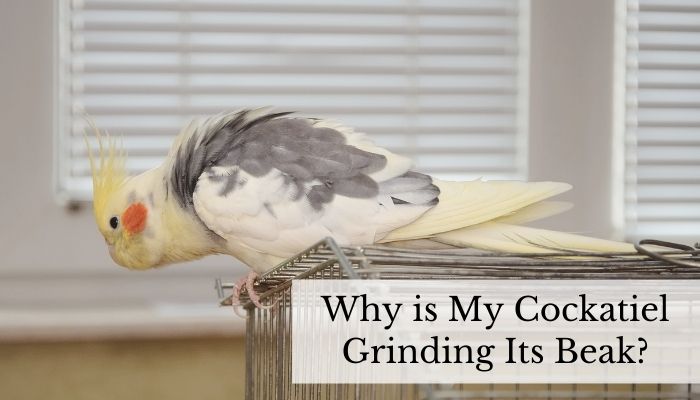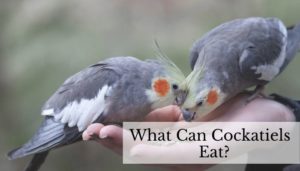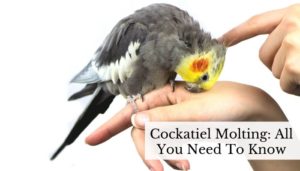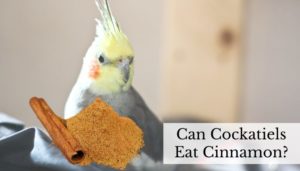Picture this: it’s a lovely afternoon, and you’re sitting on the couch relaxing. Everything is peaceful when, out of nowhere, you hear a strange sound. So you get up, go over to your pet cockatiel’s cage, and immediately find the bird grinding its beak.
You get confused and then worried. Why is your pet doing this?
Why is your cockatiel grinding its beak? Well, not to worry! Because a cockatiel grinding its beak is normal bird behavior. While it may come off as a repetitive scratching sound, you’d be pleased to know that beak grinding is the bird equivalent of a purring cat, and they do it to soothe themselves.
But if you wish to learn more about this behavior, this article will go over break grinding, why cockatiels do it, and anything else you can do to make your pet feel more comfortable.
Why Do Cockatiels Grind Their Beaks?
If you just took home your pet cockatiel with you, then it’s best to be prepared for companionship like no other. Not only are cockatiels colorful and friendly, but they’re also full of personality, and they become very friendly and close once you bond with them.
However, birds like cockatiels are also significantly different pets than dogs and cats and often show complex behavior that will leave you confused about whether they’re comfortable or annoyed.
One such behavior is beak grinding, which cockatiels often do. But is it safe? Gladly, it is. Beak grinding in cockatiels is usually a sign of contentment, although it sure does not sound like it from our perspective.
However, cockatiels reflect a relaxed state, and the birds often do it right before they roost and rest for the night. Usually, these birds tend to rest on a perch and grind their break.
This means that you will most likely see your cockatiel grinding their beaks often, especially right before bedtime. That said, while it is normal behavior, it shouldn’t be excessive in any way.
Other than beak grinding, a stressed bird will also generally chew on the cage bars or exhibit other destructive behavior like excessive grooming and beak damage.
More reading: List of What Cockatiels Can Eat
How Do Cockatiels Grind Their Beaks and What Does it Sound Like?
Cockatiels grind their beak by sliding their upper jaw (called the maxilla) against their lower jaw (called the mandible).
When cockatiels do this, it’s a repetitive motion that sounds like gently dragging your fingernails back and forth against a surface like the tabletop.
However, not to worry because while it sounds a bit alarming, it’s a safe and natural phenomenon. There are plenty of birds that exhibit this behavior out in the wild.
Does Beak-Grinding Harm Their Beaks?
There’s plenty of things we still don’t know about birds, and believe it or not, that includes the actual reason behind cockatiel beak-grinding, as well as what pushes them to do it.
That said, what we do know, however, is that they tend to do it when they feel content and relaxed and that it does not harm their beak in any way.
Additionally, they’re also not in pain, even if it does sound like it.
According to some researchers, part of the reason behind this behavior is that they might be trimming their beaks so that it doesn’t get too long. However, this is unconfirmed and mainly falls under speculation.
Regardless, if cockatiels do grind their beaks to trim it off, then it would most likely feel painless, much like trimming our nails.
However, we recommend not trying to trim your bird’s beak yourself, as this can cause a lot of pain to your pet. As such, it’s a procedure that a qualified veterinarian should only perform.
Should You Give Your Cockatiel Something to Grind its Beak On?
Again, beak grinding is perfectly normal behavior, but we understand if you’re getting worried or think your bird is being excessive.
In that case, you can always help your cockatiel by giving them something to chew or grind their beak on. There are plenty of options available, but if you’re looking for something healthy, then a piece of cuttlebone should do.
In addition to being a great bird treat, cuttlebone is also full of nutrients that your pet will benefit from, like calcium and a few other vitamins. They’re also pretty affordable and readily available. Lastly, cuttlebone is generally a good and safe way to keep your bird’s beak nice and trim without doing anything on your part.
Aside from cuttlebone, you can also purchase a beak grinding stone for your pet. While they might sound foreign or scary, grinding stones are simply rough perches for birds filled with nutrients. This means that not only can your bird perch on them, but they can also grind their beak there.
So while letting your cockatiel grind its beak on its own every day, a nice treat like a grinding stone and some cuttlebone will go a long way.
Other Beak-Related Behavior
Aside from beak-grinding, cockatiels exhibit other beak-related behavior. This includes beak banging, where a cockatiel would often bang its beak against a mirror or another object.
Usually, you’ll hear this as a rapid tapping sound, as well as a hard thump. Not to worry as well, as beak banging is simply behavior associated with courtship and mating, so your pet is bound to do this if it’s living with a female.
Furthermore, their beaks are strong enough to withstand it, and it doesn’t hurt them at all.
Aside from courtship, however, cockatiels also tend to tap to try and get your attention, so make sure that you’re spending time with your pet daily! Chances are if you provide them with enough attention, then they’ll probably start tapping as soon as they see you.
Final Thoughts
In conclusion, beak grinding is strange behavior that can make any beginning birdkeeper confused or alarmed, especially if it happens often. Luckily, it’s simply how your bird finds relaxation, so there’s absolutely nothing to worry about at all!
Just bond with your bird daily, feed it a healthy and well-balanced diet, give it a spacious place to live in, and know that the next time you hear that grinding, it’s a sign that you’re doing great as a pet owner.
Happy bird-keeping! Tap tap!




